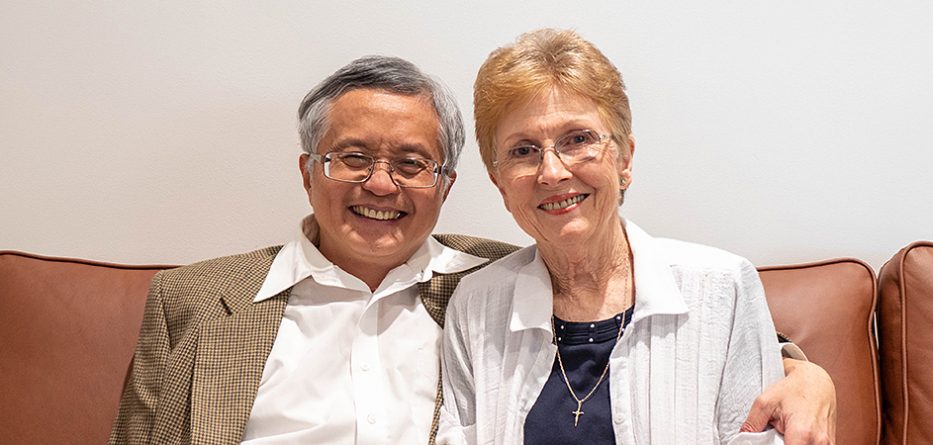In his career as a GP, Dr Michael Tan had a call to accompany the sick and the vulnerable.
Now, as a candidate to the permanent diaconate, Michael hopes that the skills he learnt in medical practice and pastoral care will enhance his new call to ministry.
“The Gospel is becoming more important and more at the heart of everything I do,” Michael told Catholic Outlook.
“When you are ordained as a deacon, you are ordained as a herald of the Gospel. You are ordained to serve the Gospel in communion with the Bishop by believing what you read, teaching what you believe and practising what you teach.”
Michael was admitted to candidacy to the permanent diaconate by Bishop Vincent Long OFM Conv, Bishop of Parramatta, during Mass at his home parish of Our Lady of the Rosary Parish, Kellyville, on 27 September. Joining fellow candidate Dr John Collins, Michael is in the final stages of formation required before being considered for ordination.
Michael is currently serving his pastoral placement at St Patrick’s Parish, Guildford, where he has been for 12 months.
Growing up as a non-Catholic in Malaysia, Michael felt drawn to Christianity throughout his high school education, and developed a devotion to Mary.
“When I was three, my grandfather died, and in the midst of all the ‘busy-ness’ at the funeral, I felt this strange peace, which I then associated with Guanyin, the Chinese Buddhist goddess of mercy.
“I went to a Catholic school for 12 years, and at the end of that time, I came to realise that whilst Guanyin is a principle of Buddhist compassion, in the person of Mother Mary, this principle became human, and a vital part of our salvation history. That was when I heard Mary say to me ‘do whatever he tells you,’ just as she told Jesus at the Wedding of Cana.
“I became a Catholic to follow Jesus under the patronage of Mary, and I took this faith journey into becoming a doctor.”
Michael credits praying a novena to Our Lady of Perpetual Succour at St Peter Julian’s Catholic Church, Haymarket, for his entry into medical studies.
“On the day of enrolment at Uni, my name had been transferred to my first preference, which was medicine. So I went back and put a note of thanksgiving in the petitions box.
“The next week, I went to Mass, and the Gospel reading was of Jesus healing the Ten Lepers. The priest preaching emphasised the importance of giving thanks for favours received, not just to those present, but also confirmed me in my vocation as a Catholic doctor.
“It is important to give thanks and not just constantly ask Our Lady for favours from the Lord.”
Michael worked as a GP until his retirement five years ago when he began his formation.
In 2005 and 2006, he became involved in palliative care, where, in caring for the dying, the first seeds were sown for his eventual decision that he was called to serve the community as a deacon.
“I had an interest in palliative care that came from this call to serve the poor, the sick and the dying, and to combine technical and professional expertise with an understanding of the pastoral role of accompanying the dying.
“During the euthanasia debate, I saw a real need to not just advocate against euthanasia, but to promote the compassionate care of the dying based on Gospel love for the sick and dying.”
Ultimately, Michael decided to retire so he could focus on the formation of Catholic healthcare professionals in ways to help the dying come to be at peace with the process and to help them live in hope in the face of death.
“I decided that I was best focussing on this aspect of faith accompaniment as a deacon rather than as a doctor.”
Michael was first introduced to the diaconate program when he and Annette, his wife of 40 years, became parishioners of St Patrick’s Church, Blacktown. Their parish priest Fr Arthur Cook, the director of diaconate formation at the time, would speak of the program during parish meetings.
Michael was also inspired after meeting the late Deacon James Phelan, a member of the palliative care team at Mt Druitt Hospital.
“He [Deacon James] struck me as a holy man in many ways, and a very pastoral presence. He brought a pastoral dimension to the palliative care team. It’s sown a few seeds and laid the ground for when I decided to become a deacon myself.”
Once ordained, Michael is looking forward to being a link between the Church and the medical sector.
“I’m looking forward to working with different parts of the Catholic Church, like Catholic Health Australia, the hospital chaplaincies in the Diocese of Parramatta, the Catholic Medical Association and also the parish councils and priests.
“I see myself in a bridge-builder role, whether it’s speaking to Catholic professionals, or to young people in a parish.
“I want to be able to link them together so that the whole is greater than the sum of its parts.”








